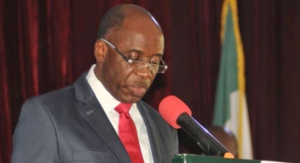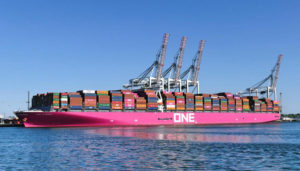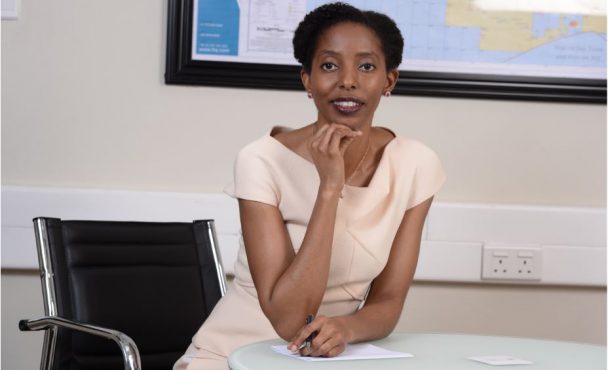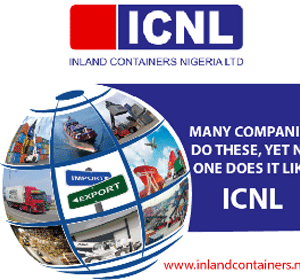For Nigeria to achieve a maritime sector of her dream, many people insist, the way to go is to create a separate ministry for it. But for obvious reasons, however, Dr Amy Jadesimi, Managing Director, Lagos Deep Offshore Ltd (LADOL feels differently. In this exclusive interview with Izuchukwu Ozoemena, her preference remains a strong private sector-driven maritime industry with tried and tested professionals at the helm.
LADOL’s EGINA is a success story nobody can stop talking about because it promises a lot. What next?
The significance of the EGINA project for Nigeria cannot be over- estimated. In terms of local content contribution, so many people do not know that as part of the EGINA project, TOTAL and the Nigerian National Petroleum Corporation, NNPC, have upgraded 35 facilities in Nigeria. One of the things they upgraded is the fabricated integration yard. As a result of that upgrade, Nigeria now has the largest crane capacity in the whole of Africa; we have the only quay-side that has ever been capable of birthing an FPSO. But the most exciting thing for me is that EGINA is not just about oil and gas. EGINA has left legacy facilities across Nigeria that can be used for maritime and industrial projects. We are looking at working with agricultural exporters. We are looking at working with companies building trains, companies building a range of different boats, because the key for us is to make sure that these facilities in LADOL are used to make Nigeria the hub for maritime activities in the whole of West Africa.
There are similar facilities in other parts of the world. In America, for instance, they have a facility in Corpus Christi that has a very high crane capacity as well, up to ten thousand tons and people come from all over the region to use that facility. Similarly, what we are expecting is that people will come from all over the region (in Africa) and bring their vessels for large fabrication projects to Nigeria so that they can use the lifting capacity available here. We also appeal that four other facilities across the country were upgraded because that means the fabrication capacity is also increased across the country. If you put those two things together, that’s where you could see the creation of 5. So we create thousands of new jobs. These jobs will come from an expansion of the level of fabrication, integration and engineering being done in oil and gas, maritime, general industry, agriculture and other areas.
What we want to focus on now is up- scaling Nigerians. We are opening our up-scaling academy in LADOL this year. The first building is already completed. We are arranging with potential partners including the Prince’s Trust International. We want to create an environment where Nigerians can be trained to do jobs that they currently cannot do so that we can maximize the benefits to Nigeria with the facilities we have in LADOL.
Are these to be domiciled in your Takwa Bay facility in Lagos?
Our facility is actually in Apapa port, it’s just on the other side. Being a terminal in Apapa port and the only 100% privately-funded terminal, we have a responsibility to expand the maritime sector as indigenous Nigerians. The founders of LADOL who are all indigenous Nigerians have made an investment whose full benefits will not be realized in their lifetime. So that tells you the level of dedication they have to the maritime sector and to the Nigerian economy. Part of that dedication shown is in the fact that they didn’t just invest in quay-side and warehouse, areas which will make money immediately, they also invested in accommodation, training school and so on and the Nigerians who would be working and training at LADOL, many of them would be accommodated by the facility. We think this is important so that they could have continuous learning on and off the job.
The Nigerian attitude of dumping long-maturing projects remains potent. In your projections, any safeguards against this?
LADOL has been around since 2001; that’s when the founders began investing. It became a free trade zone in 2006. So, this is a project of almost 20 years. We have proven our stay in power, strategic importance in Nigeria and we have proven that we are long-term investors and operators. So, we are focused right now on diversification, supporting a clean technology and a range of industries for the future.

For us, I think we have a longer time investing than your average investor. Our chairman always says one of the reasons we have that approach is because we are indigenous Nigerians; we can’t have a foreigner thinking of making an investment within 20 years to realize the benefit and even at the end of that 20 years investing their money back again. It’s only Nigerians who would do that. So our focus is on Nigeria and developing strategic infrastructure, training Nigerians and creating jobs.
What can you say about LADOL’s ISO Certification?
We believe that the best way to run a company, particularly in the long term, is through sustainability. To be sustainable, one of the things you need to have is the proper policies and procedures in place; the data and data management systems to run the company effectively. We also invested a lot in training our people and hiring enthusiastic and committed group of Nigerians. Naturally, there are international certifications that you can get once you reach a certain level of quality and you have all your policies in place. These are very difficult certifications to get. We have ISO 9007, 1400, 45001. We are the only company in the whole of West Africa to get it. I want Nigerians to pause and think about that. These are international certifications, new standards which can’t be gotten unless you operate at a certain quality. We, the 100% indigenous Nigerian company, are the only one to get it in West and North Africa. We have to do this to show the world that indigenous Nigerians can excel. What we are focusing on now is building on the current system we have. We don’t just want to operate on international standards; we want to define international standards and we believe that countries like Nigeria are the future.
We believe that people are the engines of the world and if we can have more companies like LADOL who have the right procedures in place then we can really show the world that Nigeria and Africa are the engines of production and wealth creation.
Talking about your London Stock Exchange listing, what are the implications for LADOL?
The London Stock Exchange has put together a list of African companies that they believe inspire Africa. These are companies that have very good track records and high growth prospects. It’s important for the London Stock Exchange to do this because what they are trying to do is to break the false impressions that people have of Africa.
They want to highlight indigenous African countries with companies from across the continent that are doing extremely well. They want to bring LADOL to their notice because they believe that some of the best investment opportunities in the world are in Africa. These investors need to know that the only way for them is to highlight certain companies like LADOL that are showing them that Africa is a place full of entrepreneurs, indigenous people who are creating wealth, companies into which you can invest irrespective of negative press distractions and vices that Western countries have against West Africa.
Are you equally listed on the Nigerian Stock Exchange?
We haven’t listed yet; we plan to do that in the next few years. But we are focused on investment cycle right now; we are raising more money this year. But we do talk to the people at the Nigerian Stock Exchange.
We have a lot of respect for the CEO of the Nigerian Stock Exchange, Mr. Oscar Onyema. We think that the reforms that have been made in the Nigerian Stock Exchange and even in the private exchanges that have built up over time are very encouraging for the indigenous Nigerian sector. We want to support those reforms and, of course, we want to see them go further so that more entrepreneurs can find out what we need to develop our country.
In specific terms, what has LADOL contributed to grow the national and sub-regional economy so far?
In the first instance, LADOL can truly be said to be a strategic facility for the economy. By the investments that have been made over the past 20 years, we have taken an empty piece of land and we have created the first 100% privately-developed indigenous terminal inside Apapa Port. That has already expended the size of the market. Because it’s the largest industry, we were initially focusing on servicing oil and gas although we are not a gas company. We are an industrial terminal; we will be servicing a wide range of industries. But the impact we’ve had in the oil and gas sector has already led to 10 billion dollars investment from Shell. Shell has recently launched its Bonga South West tender which they are going to invest around 10 billion in Nigeria. That investment was only approved because Shell will save up to 50% of its cost by operating out of LADOL. So by building this faculty, by having high local content, we have reduced the cost to Shell by almost 50% which reduces the cost for NNPC and increases revenue to the federal government. But what it also does is that it makes Nigeria competitive. We are often victims of divide and rule.

And that distracts us from the fact that our real competition is with other countries. So, when Shell is making its investment decisions, she is deciding between Nigeria and Brazil. The only way Shell could justify investing in Nigeria is if they are operating from a facility where their cost will also be low.
By building a facility through which we could offer almost 50% cost savings, we are able to ensure that Shell made the 10 billion dollars investment and this is part of Mr. President’s plan to lower the cost per barrel.
At the start of this current administration, the cost per barrel in Nigeria was 29 dollars. It has now come down to 20 dollars and I believe the plan is to now reduce it to 9 dollars. The only way to do that, you need more facilities like LADOL. But once you reduce the cost per barrel to 9 dollars, not only will you earn billions of dollars a year for Nigeria, you would also create a lot of jobs for Nigerians.
Once the cost is lower, the investment will skyrocket. High cost is keeping people from investing. The example I gave about how Shell has now come to expand their activities in Nigeria shows a very concrete and clear example of how if you can lower cost you will attract investment. The other thing is on the side of job creation, we are focused on sustainability and to that end, the infrastructural facilities. We are building now to accommodate a range of industries. One thing we noticed was that there is lack of SMEs and successful local companies because they have high capital expenditure. So, the facilities we are building now at LADOL will provide all of that: 24/7 power mega plant, we’ll provide drinkable water, etc, for Nigerians who want to set up their own companies particularly industrial companies.
All they need to do is worry about their business and all the other infrastructural facilities will be provided by LADOL. SMES provide probably up to 80% of the jobs. When we say that LADOL will create 50,000 thousand jobs directly and indirectly, out of those jobs we believe nearly five thousand will be created directly by us while 45,000 will be created indirectly by the businesses we are supporting. We have to stop allowing divide-and-rule especially those of us in the private sector. We have to look at the fact that we have one of the biggest marketers in the world and 90% of the market is served by foreigners. That means if we (Nigerians) come together, we could service our own market cheaper with a higher quality but we have to collaborate. That’s really our biggest challenge right now.
To what extent is LADOL collaborating with other Free Zones and government agencies?
We work very closely with government agencies. Because ours is a free zone, all government agencies are represented in the zone. But as much as we can, we also work with other zones. We actually want to deepen the elaboration going forward.
The zones in Nigeria are just coming into their own. We’ve seen the impact free zones have had in other parts of the world. The free zones in Nigeria could have the same impact. There should be closer collaboration amongst the free zones (both public and private).
What do you see as the advantages on the economy?
We need to collaborate to expand the enabling environment. A lot of positive business-friendly policies have come from this. But we need to go further; we can come together and discuss with government the type of policies that will support more growth, investment and industrialization. We can come together to talk about financing and we can talk to government and the financial sector to make sure that the kind of cheap financing we need in this country is available. We can also collaborate in the sense of when we’re doing different jobs. Right now in LADOL, we have integration facilities. What we need is for items to be fabricated in Nigeria so they can be integrated. For them to be fabricated in Nigeria, we need other zones where they have high capacity for fabrications to work with. So there are many areas from the perspective of government policy, financing, operational efficiencies where we can come together.
The string of awards LADOL received recently………..?
In addition to being the first to get 150 certifications in the region, I am also proud that as an indigenous company we do get lots of award named by London Stock Exchange as a company to inspire Africa. We are also named maritime company of the year for 2018. I myself received a wide range of awards. But the reason we’re able to receive those awards is because of our people. We really have a great team at LADOL. Many people who work with us have been with us for 5 to 10 years. We fully understand that there is a lot of training and development needed. Nigerians are hardworking and are willing to work. They have just been lacking opportunities. So, I believe LADOL provides a team- work environment where we can work closely together and that produces high quality services that leads us to getting these awards.
How do you hope to see Nigeria’s maritime industry in 2019?
I believe the hard work particularly in creating an enabling environment in streaming processes in the maritime sector as well as checking the very damaging and corrosive monopoly that have been dragging the maritime sector all of which are being championed by the managing director of the Nigerian Ports Authority, Hadiza Usman. I believe that the steps she has taken have created a platform that will allow the maritime sector to grow and attract significant investments in 2019. We highlighted the example of LADOL being a privately-developed terminal. We now know that there are several other Nigerians also thinking of making investments. I think that the NPA under Hadiza Usman’s leadership has created an environment where people are now comfortable to start making those long-term investments which means that the future is bright.
Of course we can always do more and I think reaching out to neighboring countries and showing them how working with the Nigerian maritime sector is good for them, how having Nigerians is also very important. Because of our population and the wealth of the country, there are many facilities built here that our neighboring countries could not build and operate at a competitive price. Because of our market, we can be very competitive. So, if you need to repair ships, it makes sense if you are a neighbouring country to do some of that work in Nigeria because we have the facility and the expertise to do it at a much cheaper price. Nigerian wealth and prosperity always spread to neighbouring countries. Having that expertise in Nigeria, it necessarily means there would be some technology transfer.
So, I think in 2019, the future of the maritime sector is going to be good. I think we are going to have to work extremely hard. Sometimes, it feels like we take 5 steps forward, 2 steps backward; but we shouldn’t be discouraged by that.
What is your take on a separate ministry for maritime?
I think the main thing we need to have is actually a very strong and successful private sector. If 90% of ships trading in-country are owned by Nigerian entrepreneurs, that is what will make Nigeria thrive. When the Vice President of Nigeria visited LADOL August 2018, he made the point that growing the private sector must be recognized as being critical to growing the economy. So, the question is how can the private sector be recognized as being critical to growing the economy? The question is how do we do that? For me, we need to focus on very simple areas like collaboration, financing, maintaining an enabling environment and whatever.
What have had the biggest impact on the maritime sector so far are actually the actions of the managing director of NPA. With the very strong MD we have, I think it makes a big difference. I think that if we have a similar stamina and focus in other areas (parastatals), I think that would be very good for the industry. I think our focus should be less on what is happening in government and more on what we are doing in the private sector.








